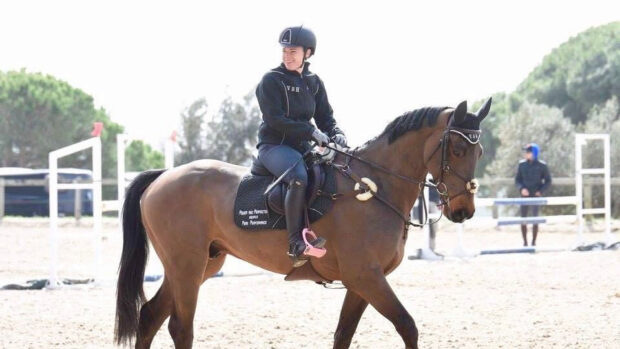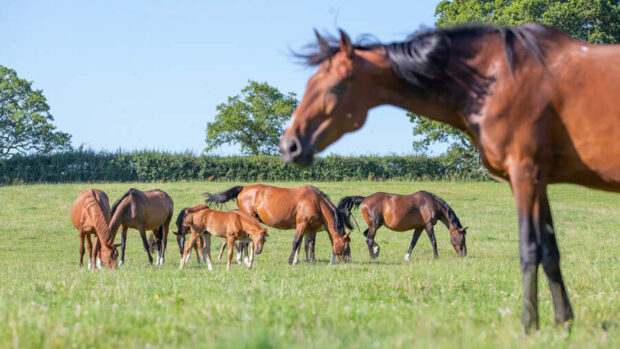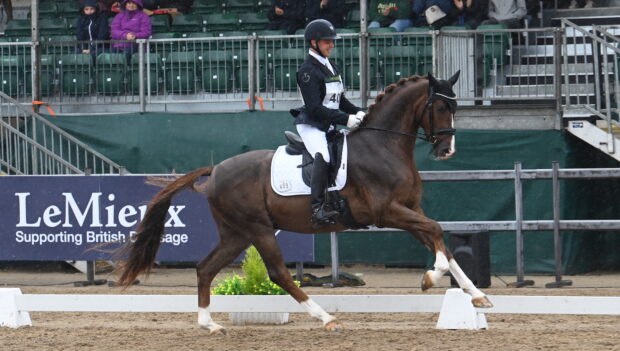Anna Ross on how we can train our young horses to be healthy, happy athletes who will be mentally and physically able to cope with the demands of sport in later life
Spring is coming! Our first foal has been born already, and we’re excited about backing the new influx of horses as well as the show season getting underway.
As we breed so many young horses, I take great interest in the importance of raising sound, healthy athletes. At this time of year there are always social media posts criticising young horses being started too early by “over-ambitious” riders.
However, there is much misconception out there about what keeps a young horse healthy in body and mind. There are also some super resources available, and peer-reviewed scientific research, to help us do the best for our horses and dispel some myths, too.
There seems to be some misunderstanding about the concept of a horse being “brought on slowly”. This should mean a carefully developed young equine athlete, not an under-muscled, weak and gangly horse that has no residual fitness or manners.
If a horse looks like a llama chewing a wasp at six years old, it’s probably been brought on badly, not slowly. The fundamental principle of dressage is to help the horse rebalance, by taking its weight onto its hindlegs to carry a rider. It is totally appropriate for a four-year-old to be able to do a prelim test with a well-balanced, correctly sized rider.
We encourage our children to play sports and run around to be fit and healthy – so why not our horses? If young horses are ridden in balance, and over different terrain, enjoying a good canter on the fields and tracks, and learning about the outside world, they will be mentally and physically able to cope with the demands of sport in later life.
Future soundness
It’s also the time of year where a lot of horses change hands, and sales are strong despite the economic climate.
Great emphasis is put on X-rays for sales but a horse is made up of so much more than just bones. We breed and see horses through from foals to international grand prix, and there are myriad things that can ensure a horse will have a sound and healthy life that are nothing to do with its X-rays.
Is the rider going to be in balance? Is the horse going to suffer repetitive strain because the rider wants to over-practise? Will it be well shod? Will its nutritional needs be met?
I’d be very interested to know how many top grand prix horses have clean X-rays.
Dressage riders tend to be perfectionists so can often be tempted to over-train, increasing the risk of repetitive strain injuries. Many injuries to tendons and ligaments tend to be chronic, rather than acute, in dressage horses.
There is now some great technology that logs your schooling session, records your work on each rein and gait and counts your transitions, showing it all on an app on your phone. It can be very revealing, and interesting to find out what you are actually doing, as opposed to what you think you are doing. This can help the over-practiser adjust their training to include less repetition.
BD, please ditch the CDs
Finally, a plea: British Dressage, please switch to music files instead of CDs for freestyle tests. Not only is CD technology 40 years out of date, it’s so disappointing for competitors when their CDs are not compatible with the venue’s system and don’t play – as happened at a recent regional championship.
The technology we use must develop at a healthy rate, like our horses.
● Do you agree with Anna? Have you ever used technology to track your riding and training? Tell us about your experience at hhletters@futurenet.com including your name, nearest town and county for the chance to have your views published in Horse & Hound
- This exclusive column will also be available to read in Horse & Hound magazine, on sale Thursday 23 February, 2023
You may also be interested in…

Carl Hester: ‘Ensuring equine welfare at all levels – not just among elite horses’

‘They still know how to own the arena’: watch Valegro and Uthopia strutting their stuff in retirement

‘Carl Hester knew me as the boy in chaps and tassels’ – and 8 other things you never knew about Andrew Gould

Subscribe to Horse & Hound magazine today – and enjoy unlimited website access all year round
Horse & Hound magazine, out every Thursday, is packed with all the latest news and reports, as well as interviews, specials, nostalgia, vet and training advice. Find how you can enjoy the magazine delivered to your door every week, plus options to upgrade your subscription to access our online service that brings you breaking news and reports as well as other benefits.




